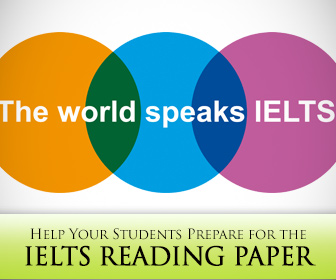9 Tips to Help Your Students Prepare for the IELTS Reading Paper

This list of 10 creative ways to work with reading texts was kindly shared by Churchill House, and is available for public download on their website www.churchillhouse.co.uk.
The web is a great source of textual information, but if you are like us, you won’t have the time or inclination to spend hours turning pages from the web into complete lesson plans with worksheets, handouts etc. So here are our top ten ideas for taking ANY text and using it in class with the least amount of preparation time on your part. Enjoy!
 EXPAND THE TEXT
EXPAND THE TEXTWith short, simple texts, get students to add an adjective in front of every noun / an adverb to every verb etc.
For slightly longer texts - before class write (10) extra clauses or sentences that can be inserted into the text. Write these up in jumbled order on the board and get students to add them in the most appropriate places.
 REDUCE THE TEXT
REDUCE THE TEXTGet students to reduce the text to EXACTLY (100) words OR reduce the total number of sentences by (50%).
 RECONSTRUCT THE TEXT
RECONSTRUCT THE TEXTBefore class, write a list of key words from the text in jumbled order on a sheet of paper. Make one copy for each group of students.
In class, give out the text to all the students. Get them to read it through. Now ask them to turn over the text. Hand out the jumbled keywords. Ask students to put the keywords back into the correct order WITHOUT LOOKING AT THE TEXT. When they get stuck, allow them to reread to the text (but first get them to cover up the jumbled words again.)
When all the students have got the words in the correct order, take the text away. Get students to reconstruct the text (orally or in writing) from the key words.
 MATCHING
MATCHINGBefore class, get a heavy black pen and cross out the first sentence of each paragraph. (If you downloaded the page off the web, use your word processor to delete the sentences before printing.)
In class, write the missing sentences up in jumbled order on the board and get students to add them back into the text in the correct place.
Note: choosing the first sentence of a paragraph is particularly useful as these often summarise the main idea of the paragraph. Students can use these sentences to help them understand and structure the text.
 TRANSFORM THE TEXT
TRANSFORM THE TEXTStudents must transform the text in some way, for example:
 DEDUCTION
DEDUCTIONCopy the text onto a piece of A4 paper. Tear off a column (say 4cm wide) down the left hand side of the copy and a similar sized column off the right hand side. Photocopy and hand out the remaining “middle” part of the story. Students must work together to deduce the whole story from the bits they have. Hand out the original story for comparison at the end.
 TEXT QUIZ
TEXT QUIZHand out the chosen text to the class. Give them time to read it, check new words etc.
Now get the students in groups to prepare (15) questions about the text which another group will have to answer from memory. Questions should be factual.
When the groups are ready, cover up all copies of the text, then get groups to swap their question sheets and answer each other’s questions. The group that answers the most questions correctly wins.
 WORD PARTNERSHIPS
WORD PARTNERSHIPSBefore class, find (15) useful word partnerships in your chosen text. Write the first word of each partnership down the left-hand side of a piece of paper.
E.g.
Solve …………
(Don’t forget that word partnerships can consist of two or three words, and also that sometimes a word is partnered with another one in a completely different part of the text. E.g. “The puzzle, which had baffled experts for well over 20 years, was finally solved by a 12-year-old girl from Ramsgate.”)
In class, hand out the text. Allow students time to read and ask questions.
Now get the students to complete the sheet that you prepared by finding the partners for each word.
As a follow-up, students can test each other by covering up one of the columns on their sheets and trying to remember the missing word partners.
 REACTIONS
REACTIONSBefore class, prepare a list of sentences along the following lines:
What I found most interesting about this text was…..
boring
shocking
amusing
irritating
baffling
incredible
etc.
In class, allow students time to read the text and check out any problems. Then ask them to complete all / some of the sentences from your list.
When they have finished, put them in groups to discuss their reactions.
 TALK ABOUT THE TEXT
TALK ABOUT THE TEXTOne of the things we often do in real life is tell someone else about a story / news item / magazine article etc that we read.
To do this in class, all you need is a text and a group of students. Get the students to read the text. Now ask them to describe the text and their reactions to it to their partner. Get them to start like this:
“I was reading this (story) the other day and it was really interesting. What it said was…..”
Variation: have two or more texts and get different students to read and talk about different texts.